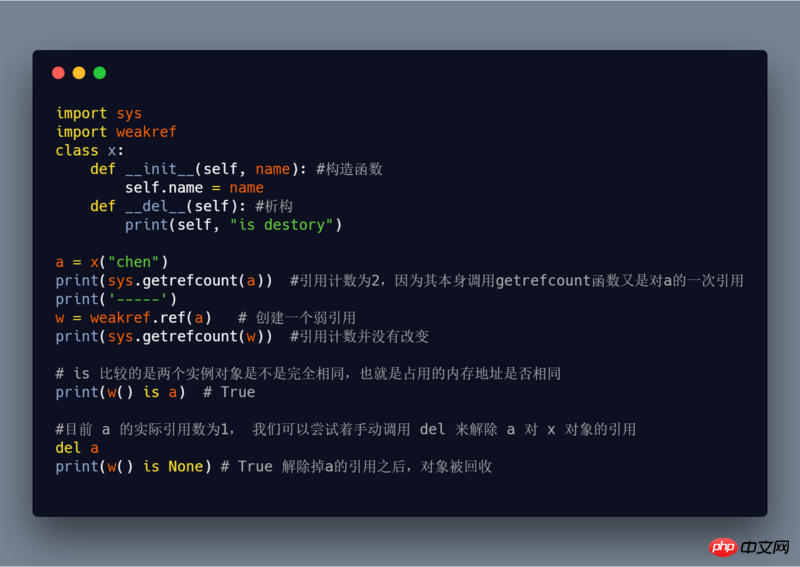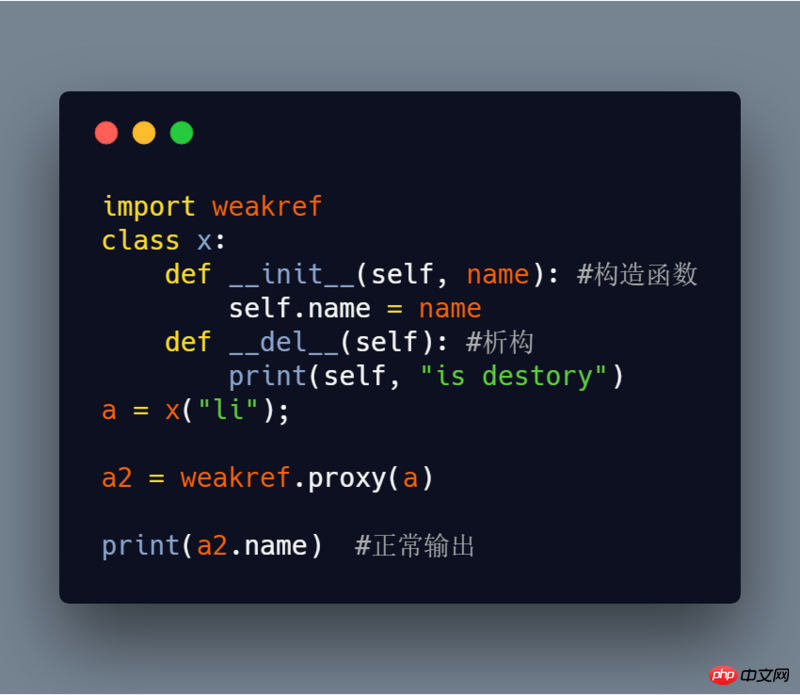 Backend Development
Backend Development
 Python Tutorial
Python Tutorial
 A simple understanding of python reference counting and weak references (with examples)
A simple understanding of python reference counting and weak references (with examples)
A simple understanding of python reference counting and weak references (with examples)
This article brings you a simple understanding of python reference counting and weak references (with examples). It has certain reference value. Friends in need can refer to it. I hope it will be helpful to you.
Written in front:
The previous socket series has come to an end, mainly to make a summary and record of what I have learned.
Next I plan to write an HTTP server that supports concurrency based on libevent. Because the master in the study group had already developed a server that supports both HTTP and WebSocket before, I felt very interested after reading it, so I bought this network programming book to read. I plan to refer to his to write a streamlined version,
only supports HTTP. After I finish writing it, I can share it with everyone. Although it cannot be used in a production environment, I believe that after learning the source code, it will be a great improvement for myself.
Next enter the topic:
First put the example code:

We create one for testing The x object includes a constructor and a destructor.
The x object is initialized for the first time and referenced by variable a, so the reference count here is 1. Then get the number of references through getrefcount, which here becomes 2, because calling the function getrefcount itself is also a reference to a.
Next, create a weak reference through weakref.ref(). After printing the reference count through getrefcount, it is found that the count has not changed.
w() is a This sentence means to determine whether the two instances are exactly the same, that is, whether they occupy the same memory address.
Then we use del a to dereference a to the x object. Note that del here does not directly recycle the x object, but dereferences it. We know that once the reference of a variable is 0, it will be Recycle. So the x object is recycled after calling del.
Through the previous code, we can see that the method of calling weak references is the method of class functions. However, you can use proxy to call using variable names instead.

At this point I believe that I have definitely mastered the use of weak references. But what exactly does a weak reference do?
Like many other high-level languages, Python also has a garbage collection mechanism. Each object has a reference count, and when this count reaches 0, the object can be safely destroyed.
Since only one object can be recycled at a time, reference counting cannot recycle objects with circular references. A set of objects that reference each other will survive forever if they are not directly referenced by other objects and are inaccessible.
If an application continues to generate such inaccessible object groups, a memory leak will occur.
So weak references are very suitable for handling this kind of circular reference scenario.
The above is the detailed content of A simple understanding of python reference counting and weak references (with examples). For more information, please follow other related articles on the PHP Chinese website!

Hot AI Tools

Undresser.AI Undress
AI-powered app for creating realistic nude photos

AI Clothes Remover
Online AI tool for removing clothes from photos.

Undress AI Tool
Undress images for free

Clothoff.io
AI clothes remover

AI Hentai Generator
Generate AI Hentai for free.

Hot Article

Hot Tools

Notepad++7.3.1
Easy-to-use and free code editor

SublimeText3 Chinese version
Chinese version, very easy to use

Zend Studio 13.0.1
Powerful PHP integrated development environment

Dreamweaver CS6
Visual web development tools

SublimeText3 Mac version
God-level code editing software (SublimeText3)

Hot Topics
 1377
1377
 52
52
 HadiDB: A lightweight, horizontally scalable database in Python
Apr 08, 2025 pm 06:12 PM
HadiDB: A lightweight, horizontally scalable database in Python
Apr 08, 2025 pm 06:12 PM
HadiDB: A lightweight, high-level scalable Python database HadiDB (hadidb) is a lightweight database written in Python, with a high level of scalability. Install HadiDB using pip installation: pipinstallhadidb User Management Create user: createuser() method to create a new user. The authentication() method authenticates the user's identity. fromhadidb.operationimportuseruser_obj=user("admin","admin")user_obj.
 Navicat's method to view MongoDB database password
Apr 08, 2025 pm 09:39 PM
Navicat's method to view MongoDB database password
Apr 08, 2025 pm 09:39 PM
It is impossible to view MongoDB password directly through Navicat because it is stored as hash values. How to retrieve lost passwords: 1. Reset passwords; 2. Check configuration files (may contain hash values); 3. Check codes (may hardcode passwords).
 The 2-Hour Python Plan: A Realistic Approach
Apr 11, 2025 am 12:04 AM
The 2-Hour Python Plan: A Realistic Approach
Apr 11, 2025 am 12:04 AM
You can learn basic programming concepts and skills of Python within 2 hours. 1. Learn variables and data types, 2. Master control flow (conditional statements and loops), 3. Understand the definition and use of functions, 4. Quickly get started with Python programming through simple examples and code snippets.
 How to optimize MySQL performance for high-load applications?
Apr 08, 2025 pm 06:03 PM
How to optimize MySQL performance for high-load applications?
Apr 08, 2025 pm 06:03 PM
MySQL database performance optimization guide In resource-intensive applications, MySQL database plays a crucial role and is responsible for managing massive transactions. However, as the scale of application expands, database performance bottlenecks often become a constraint. This article will explore a series of effective MySQL performance optimization strategies to ensure that your application remains efficient and responsive under high loads. We will combine actual cases to explain in-depth key technologies such as indexing, query optimization, database design and caching. 1. Database architecture design and optimized database architecture is the cornerstone of MySQL performance optimization. Here are some core principles: Selecting the right data type and selecting the smallest data type that meets the needs can not only save storage space, but also improve data processing speed.
 Python: Exploring Its Primary Applications
Apr 10, 2025 am 09:41 AM
Python: Exploring Its Primary Applications
Apr 10, 2025 am 09:41 AM
Python is widely used in the fields of web development, data science, machine learning, automation and scripting. 1) In web development, Django and Flask frameworks simplify the development process. 2) In the fields of data science and machine learning, NumPy, Pandas, Scikit-learn and TensorFlow libraries provide strong support. 3) In terms of automation and scripting, Python is suitable for tasks such as automated testing and system management.
 How to use AWS Glue crawler with Amazon Athena
Apr 09, 2025 pm 03:09 PM
How to use AWS Glue crawler with Amazon Athena
Apr 09, 2025 pm 03:09 PM
As a data professional, you need to process large amounts of data from various sources. This can pose challenges to data management and analysis. Fortunately, two AWS services can help: AWS Glue and Amazon Athena.
 Can mysql connect to the sql server
Apr 08, 2025 pm 05:54 PM
Can mysql connect to the sql server
Apr 08, 2025 pm 05:54 PM
No, MySQL cannot connect directly to SQL Server. But you can use the following methods to implement data interaction: Use middleware: Export data from MySQL to intermediate format, and then import it to SQL Server through middleware. Using Database Linker: Business tools provide a more friendly interface and advanced features, essentially still implemented through middleware.
 How to start the server with redis
Apr 10, 2025 pm 08:12 PM
How to start the server with redis
Apr 10, 2025 pm 08:12 PM
The steps to start a Redis server include: Install Redis according to the operating system. Start the Redis service via redis-server (Linux/macOS) or redis-server.exe (Windows). Use the redis-cli ping (Linux/macOS) or redis-cli.exe ping (Windows) command to check the service status. Use a Redis client, such as redis-cli, Python, or Node.js, to access the server.



